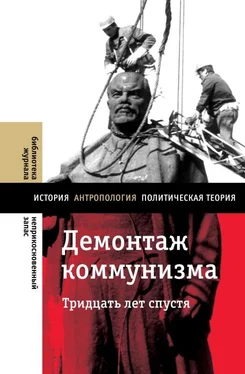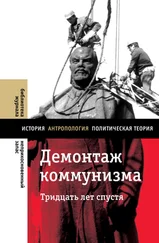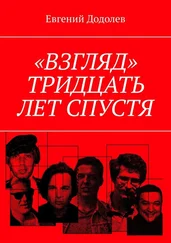Solnick S. L. Stealing the State: Control and Collapse in Soviet Institutions. Cambridge, MA: Harvard University Press, 1998; Kotkin S. Armageddon Averted: Soviet Collapse, 1970–2000. Oxford: Oxford University Press, 2001; McFaul M. Russia’s Unfinished Revolution: Political Change from Gorbachev to Putin. Ithaca: Cornell University Press, 2001.
Впервые эту параллель провел Сэмюэл Хантингтон ( Huntington S. P. Political Development and Political Decay // World Politics. 1965. Vol. 17 (3). P. 416).
Bueno de Mesquita B., Smith A. The Dictator’s Handbook: Why Bad Behavior is Almost Always Good Politics. New York: Public Affairs, 2011.
Przeworski A. Democracy and the Market. Р. 86.
Gel’ man V. Authoritarian Russia: Analyzing Post-Soviet Regime Changes. Pittsburgh: University of Pittsburgh Press, 2015.
Robertson G. B. The Politics of Protest in Hybrid Regimes: Managing Dissent in Post-Communist Russia. Cambridge: Cambridge University Press, 2011; Greene S. Moscow in Movement: Power and Opposition in Putin’s Russia. Stanford: Stanford University Press, 2014.
Gel’ man V. The Politics of Fear: How Russia’s Rulers Counter their Rivals // Russian Politics. 2016. Vol. 1 (1). P. 27–45.
Way L. A. Pluralism by Default: Weak Autocrats and the Rise of Competitive Politics. Baltimore: Johns Hopkins University Press, 2015.
Jones Luong P. Institutional Changes and Political Continuity in Post-Soviet Central Asia: Power, Perceptions, and Pacts. Cambridge: Cambridge University Press, 2002.
Way L. A. Pluralism by Default.
В какой-то степени к модели «плюрализма по умолчанию» приближается и развитие Кыргызстана ( Radnitz S. Weapons of the Wealthy: Predatory Regimes and Elite-Led Protests in Central Asia. Ithaca: Cornell University Press, 2012).
Hale H. E. Patronal Politics.
Collier D., Levitsky S. Democracy with Adjectives: Conceptual Innovations in Comparative Research // World Politics. 1997. Vol. 49 (3). P. 446.
Olson M. Dictatorship, Democracy, and Development // American Political Science Review. 1993. Vol. 87 (3). P. 573.
Levitsky S., Way L. A. Competitive Authoritarianism.
Robertson G. B. The Politics of Protest in Hybrid Regimes: Managing Dissent in Post-Communist Russia. Cambridge: Cambridge University Press, 2011.
Radnitz S. Weapons of the Wealthy: Predatory Regimes and Elite-Led Protests in Central Asia. Ithaca: Cornell University Press, 2012.
Дерлугьян Г. Армения на выходе из постсоветской реставрации: анализ возможностей. М.: Российский фонд содействия образованию и науке, 2017.
Huntington S. P. The Third Wave.
Przeworski A. Democracy as a Contingent Outcome of Conflicts / J. Elster, R. Slagstad (eds). Constitutionalism and Democracy. Cambridge: Cambridge University Press, 1988. P. 59.
Crozier M., Huntington S. P., Watanuki J. The Crisis of Democracy: Report on the Governability of Democracies to the Trilateral Commission. New York: New York University Press, 1975.
Transitions from Authoritarian Rule: Prospects for Democracy.
Munck G. L., Snyder R. Passion, Craft, and Method in Comparative Politics. Baltimore: Johns Hopkins University Press, 2007. Р. 292.
Самого О’Доннелла, с его предыдущей концепцией «бюрократического авторитаризма» в Латинской Америке ( O’Donnell G. Modernization and Bureaucratic Authoritarianism: Studies in South American Politics. Berkeley: Institute of International Studies, University of California, 1973), можно считать типичным представителем «структурного» направления; то же самое относится и к другим участникам проекта «Переходы от авторитарного правления»: Фернанду Энрике Кардозу, Адаму Пшеворскому, Филиппу Шмиттеру и Альфреду Степану; в целом этот проект представлял собой смену фокуса, а не отказ от прежней научной повестки дня.
Rustow D. Transition to Democracy: Towards a Dynamic Model // Comparative Politics. 1970. Vol. 2 (3). P. 337–363.
The Breakdown of Democratic Regimes. 3 vols / J. J. Linz, A. Stepan (eds). Baltimore: Johns Hopkins University Press, 1978.
Przeworski A. Democracy and the Market; Colomer J. Strategic Transitions: Game Theory and Democratization. Baltimore: Johns Hopkins University Press, 2000.
Mahoney J., Snyder R. Rethinking Agency and Structure in the Study of Regime Changes // Studies in Comparative International Development. 1999. Vol. 34 (2). P. 3–32.
Frye T. Russian Studies is Thriving, Not Dying // The National Interest. 2017. October 3; http://nationalinterest.org/feature/russian-studies-thriving-not-dying-22547 (доступ 29 января 2021).
Лозунг «Знай своего врага» – один из основных стимулов развития советологии в период холодной войны ( Engerman D. C. Know Your Enemy: The Rise and Fall of America’s Soviet Experts. Oxford: Oxford University Press, 2009) – не утратил актуальности и сегодня.
Hale H. E. Patronal Politics; Way L. A. Pluralism by Default.
Davenport C. Multi-Dimensional Threat Perception and State Repressions: An Inquiry into Why States Apply Negative Sanctions // American Journal of Political Science. 1995. Vol. 38 (3). P. 683–713.
Levitsky S., Way L. A. Competitive Authoritarianism; Way L. A. Pluralism by Default.
Hale H. E. Patronal Politics.
Silitski V. Preempting Democracy: The Case of Belarus // Journal of Democracy. 2005. Vol. 16 (4). P. 83–97.
Way L. A. Pluralism by Default; Gel’ man V. The Politics of Fear. P. 27–45.
Reuter O. J. The Origins of Dominant Parties: Building Authoritarian Institutions in Post-Soviet Russia. Cambridge: Cambridge University Press, 2017.
Читать дальше
Конец ознакомительного отрывка
Купить книгу






